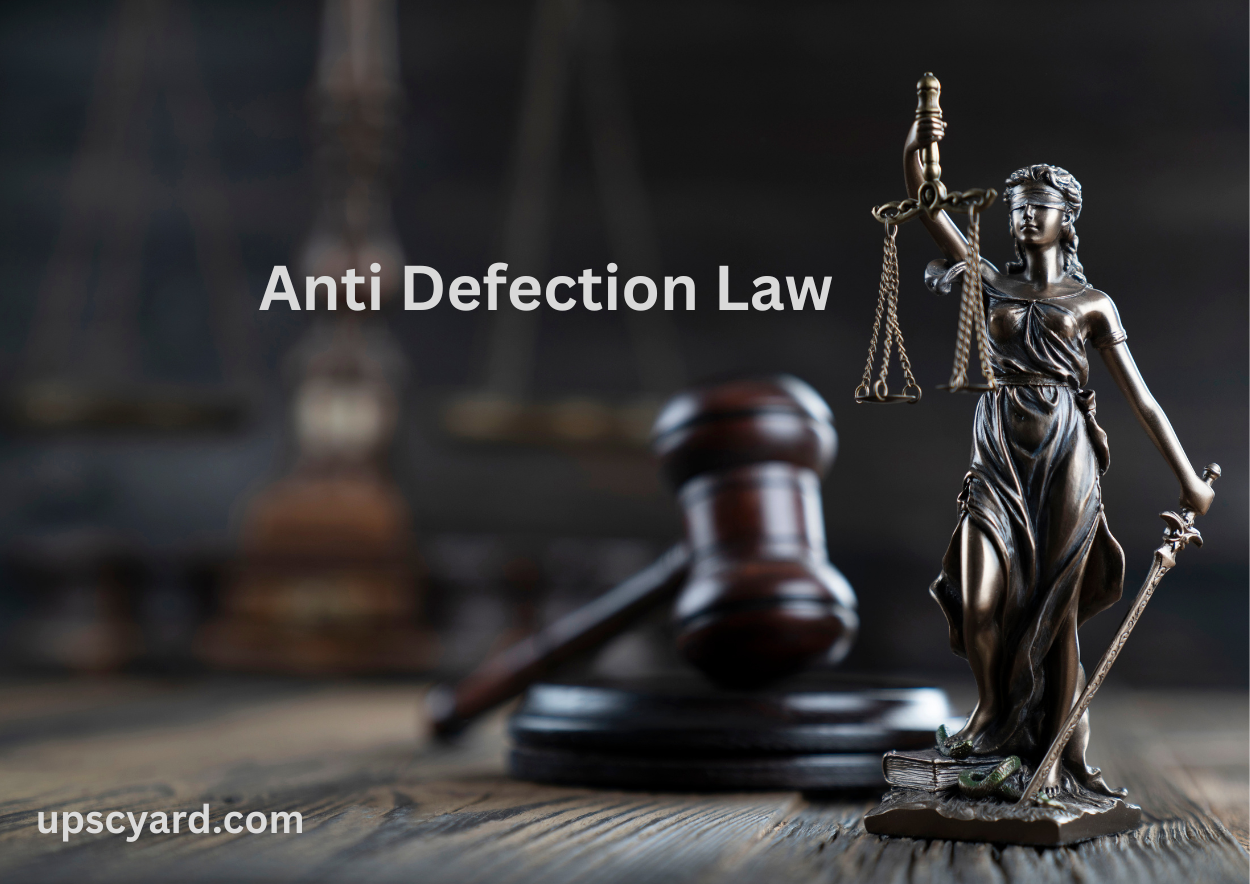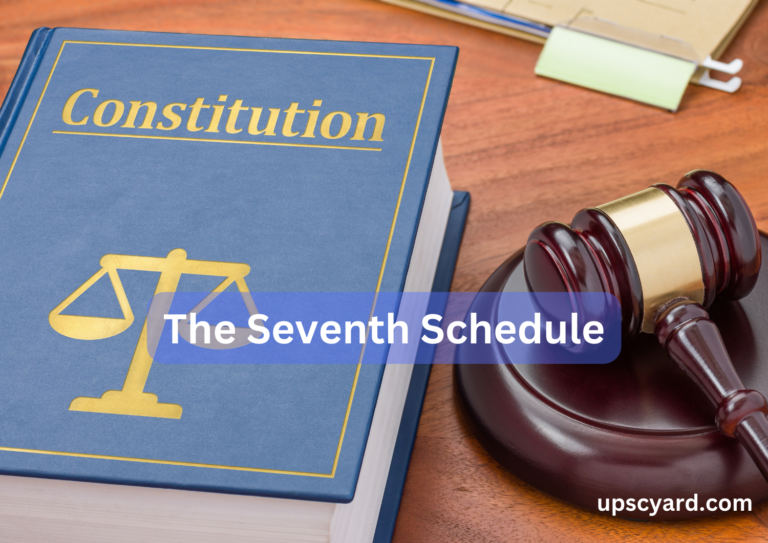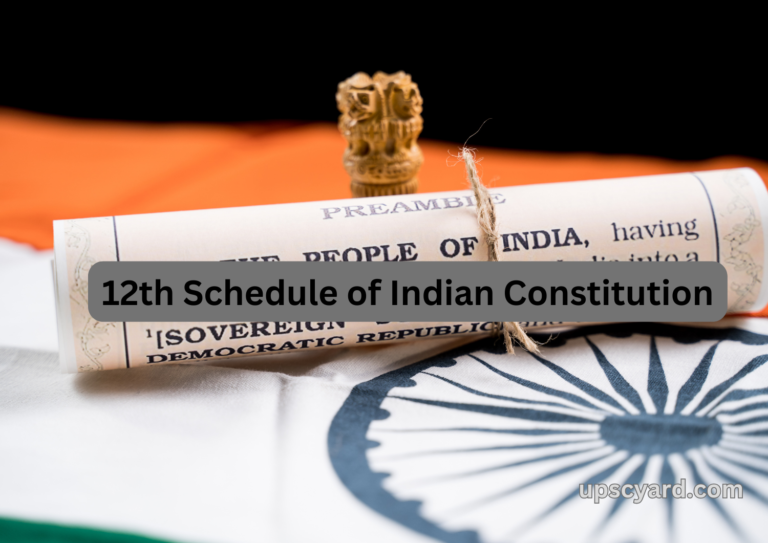Understanding Defection:
Defection refers to the transfer of loyalty or allegiance from one group or entity to another. It can occur in various contexts, such as when football players switch from one club to another. In politics, defection involves a change in party affiliation or allegiance by any member of a legislative body. Anti Defection law are enacted to prevent and penalize such political defections.
TENTH SCHEDULE
[Articles 102(2) and 191(2)]
Provisions as to disqualification on ground of defection
Scope of Anti Defection Law in India:
In the Indian context, the Anti Defection law applies to all elected, nominated, and independent members of various legislative bodies, including:
a. Lok Sabha, including the Speaker and Deputy Speaker.
b. Rajya Sabha, excluding the Chairman (Vice President of India) but including the Vice Chairman.
c. State Legislative Assemblies, including the Speaker and Deputy Speaker.
d. State Legislative Councils, including the Chairman and Vice Chairman.
However, it does not extend to elected members of local self-governments, such as Panchayati raj institutions and urban local bodies, as these fall exclusively under the State List, and the central government cannot legislate on matters in the State List under ordinary circumstances.
Global Perspective on Defection:
Defection is not unique to India and has been observed in most democratic nations worldwide, including the United States, the United Kingdom, Canada, France, Germany, and others. In such countries, defection is considered a natural outcome of deliberative democracies, where discussions and disagreements are part of the political process.
For example, Winston Churchill, a prominent Prime Minister of the United Kingdom, defected multiple times during his political career. However, many of these democratic nations, unlike India, do not have specific Anti Defection laws. In the UK, Members of Parliament (MPs) have the freedom to vote and express opinions regardless of their party affiliation. In the United States, the President must persuade representatives from various political parties, as they can vote independently of party lines.
In contrast, countries in South Asia, such as India, Pakistan, Nepal, Sri Lanka, Singapore, and some African nations like Kenya and South Africa, have codified laws addressing Anti Defection.
Uniqueness of India’s Anti Defection Law:
India not only has a codified law on Anti Defection but also incorporates it into the country’s supreme document, the Indian Constitution. This highlights the significance and constitutional basis of India’s approach to tackling defection in its political system.
Proposed Reforms for the Anti Defection Law:
Here are several recommendations aimed at reforming the Anti Defection Law:
- Bar Defectors from Public Office: The National Commission to Review the Working of the Constitution in 2002 suggested that defectors should be prohibited from holding any public office or lucrative political positions for the remainder of their term. This recommendation was implemented through the 91st Constitutional Amendment Act of 2003.
- Invalidation of Defector Votes: It was proposed that votes cast by defectors to topple a government should be considered invalid. However, this recommendation has yet to be implemented due to the complexity of determining the voter’s intent.
- Treat Splits and Mergers as Defection: The Law Commission’s 170th Report from 1999 recommended that splits and mergers within political parties should also be categorized as defection. This recommendation was implemented through the 91st Constitutional Amendment Act of 2003, with some exceptions.
- Pre-poll Alliances as Political Parties: Another recommendation was to treat pre-poll electoral alliances as political parties. However, this suggestion has yet to be implemented.
- Limit Issuance of Whips: The proposal to limit the issuance of whips by political parties to situations when the government is genuinely in danger has yet to be put into practice.
- Decision-Making Authority: The Election Commission of India, in collaboration with the Dinesh Goswami Committee on Electoral Reforms in 1990, recommended that the President or Governor should make decisions regarding defection based on the binding advice of the Election Commission. However, this recommendation still needs to be implemented.
These proposed reforms aim to enhance the effectiveness and fairness of the Anti Defection Law, addressing various aspects of political defection and its consequences.
Anti Defection Law Simplified
Origins: Enacted in 1985 via the 52nd Amendment to the Indian Constitution.
Purpose: Introduction of the Tenth Schedule to curb the evil of political defections defections.
Scope: Applicable to members of political parties, independent members, and nominated members in Parliament or state legislatures.
When Can a Legislator Face Disqualification?
a. Party Members: Disqualified if they:
- Voluntarily leave their political party.
- Vote against party directions.
- Abstain from voting when the party directs, except with prior party permission or condonation within 15 days.
b. Independent Candidates: Face disqualification if they join a party post-election.
c. Nominated Members: Risk disqualification if they join a party six months after becoming a legislature member.
Are There Any Exceptions?
- Exceptions exist if a person’s original political party merges with another (only if over two-thirds of party members agree):
- Members join the new party.
- Members opt to function as a separate group, rejecting the merger.
Who Holds the Disqualification Power?
- The Chairman or the Speaker of the House possesses the authority to disqualify a member.
- In case of a complaint concerning the Chairman or Speaker’s defection, a member of the House elected by that House makes the decision.
Why Was It Enacted?
- Enacted following a committee’s recommendations led by then-Home Minister YB Chavan in 1969.
- Aimed to prevent legislators from switching parties for monetary gains or political office, barring them from office and future elections for a prescribed period.
Impact on Legislators:
- Restricts legislators from expressing their conscience in the House.
- Weakens the link of accountability between voters and elected representatives.
- Alters the power balance between the executive and the legislature, limiting a member’s ability to hold the government accountable.
- Shifts decision-making power in the House to a few party leaders and empowers them to enforce party-aligned voting.
Governmental Accountability to Parliament:
- In a parliamentary democracy, government accountability to Parliament is crucial. This accountability is tested through questions to Ministers, policy discussions, and national issue debates. The elected House can even dismiss the government through a no-confidence motion.
- The anti defection law undermines a legislator’s duty to hold the government accountable by forcing them to follow party leadership instructions on most decisions. They can debate and dissent but must vote as per the party whip, potentially making debates redundant.
- For instance, in December 2012, there was a vote in Lok Sabha on allowing 51% foreign direct investment in multi-brand retail, with all Congress MPs voting for and all BJP MPs against.
Citizen Representation:
- The law breaks the chain of accountability between elected representatives and voters. Citizens elect members for five years and evaluate their performance based on parliamentary records. They can convey their opinions to legislators and expect representation.
- Legislators must justify their decisions, allowing citizens’ views to be represented. If not, citizens can express displeasure or vote out the representative in the next election.
Integrity of the House:
- The law centralizes decision-making in the hands of a few party leaders rather than the larger body of legislators. Parties often issue whips, making legislators vote according to party leadership’s wishes.
- This results in voting being influenced by a few leaders rather than the beliefs of all legislators.
Comparison with Other Democracies:
- Mature democracies like the US, UK, and Canada do not have anti defection laws. They may issue whips, but defying them does not lead to disqualification from the legislature, although the party may take disciplinary action.
- Among the 40 countries with anti defection laws, only six mandate legislators to vote along party lines: India, Pakistan, Bangladesh, Guyana, Sierra Leone, and Zimbabwe.
Impact on Political Stability:
- In various instances, the anti defection law has not guaranteed political stability. For example, in the 2008 Confidence Motion, 21 MPs defied their party’s whips during voting, highlighting the law’s limitations.
- In 2016, during the Uttarakhand Appropriation Bill, nine MLAs from the ruling party sided with the opposition, potentially endangering the Congress government.
- In Arunachal Pradesh in 2015, 20 Congress MLAs defected, leading to a no-confidence vote against the ruling government. The Supreme Court later deemed the Congress government’s dismissal illegal.
Impartial Decisions:
- Several cases reveal delays in deciding disqualifications:
- In Andhra Pradesh, 23 YSR Congress Party MLAs defected to the ruling Telegu Desam Party from 2015-18, yet the Speaker took no action on disqualification petitions. Some defectors were even appointed as Ministers.
- In Telangana, 26 MLAs defected from opposition parties to Telangana Rashtriya Samiti from 2014-18, with no action taken by the Speaker. Twelve of these defectors were made Ministers.
Reforms Needed:
- To improve the system, political parties should limit whip issuance to situations endangering the government.
- Disqualification should be confined to instances where members voluntarily give up party membership or vote against party whips in confidence or no-confidence motions.
- Provisions exempting mergers from disqualification should be removed.
Reform Proposals:
- Clear definitions are needed for “voluntarily giving up party membership” and “political party,” including considering pre-poll electoral fronts as political parties.
- Disqualification decisions should be made by the President/Governor upon the Election Commission’s advice.
- Speakers should promptly rule on Tenth Schedule disputes, aiming for a six-month resolution period.
- Expelled members should face restrictions, like a prohibition on joining another party or holding government offices. Defectors should be barred from public office for the remaining term.
- Votes cast by defectors to topple a government should be considered invalid.
Terms and Conditions + SC Judgements:
- Speakers should not have suo moto powers in disqualification cases.
- The “Kihoto Hollohan vs. Zachillhu And Others” (1992) case upheld the Speaker’s discretion but allowed court intervention for constitutional violations, malice, non-compliance with natural justice, and perversity.
- Courts cannot stay the process but can review later. The Supreme Court has reprimanded Speakers for prolonged disqualification proceedings.
- Governors can call for a floor test if the government is on shaky ground, even if disqualification proceedings are pending.
- Resigning as an MLA and joining another party does not trigger disqualification, and members can contest bye-elections in both disqualification and resignation cases.
Mains Practice Question
Q. The Anti Defection Law has often been criticized as a means of political vendetta rather than a mechanism to uphold the integrity of parliamentary proceedings. comment
M.C.Q.
Q. The 52nd Constitution Amendment deals with which of the following?
A) Reservation of 30% posts for the women in government recruitments
B) Free and compulsory education for all the children between age of 6-14 years
C) Continuation of reservation for backward classes in government employment
D) Provides provision related to anti defection law in indiaAnswer :- D
Q. The anti defection law aims to punish legislative members for changing political parties.
2.The 52nd amendment act added 10th schedule to Constitution. Which Of the above statements is/are true?
A) Only 1
B) Only 2
C) Both 1 & 2
D) Neither 1 & 2Answer :- C




